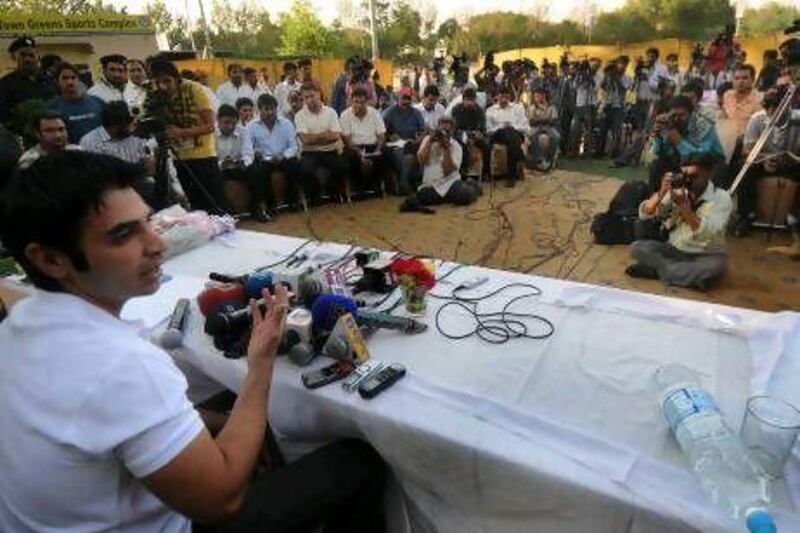If you took the defiance out of Salman Butt, there probably wouldn't be much left. I'm not sure how it is that life has shaped him such, but it's fair to assume that it had helped him to reach the point in his career that he had before he was caught out by a News of the World sting.
In the seven years since his debut in 2003, he'd been dropped and subsequently recalled seven times: seven times at only 25 years old! Yet he displayed none of the scars others similarly mistreated wear so openly, the paranoid attention-seeking, the slowly fading desire to continue proving yourself. So it was handy being that defiant because it meant he kept returning.
He'd always struck me as a young man with a firm – too firm – belief in his own self, bereft of self-doubt. In Hobart once, he'd made a hundred soon after another recall but in the process ran out Mohammad Yousuf, his captain. Yousuf criticised him publicly for being selfish. The next day, Butt was asked by an Australian reporter for a reaction to Yousuf's comments. Butt said he hadn't seen them. When the reporter began to read aloud what Yousuf had said, Butt cut him down immediately, as a king in his court might do a foolish minion: "I didn't ask you to tell me."
Through the year leading up to his criminal trial, he floated like a hovercraft on an invisible bed of this cocksureness. Out of the three, he was the most public protestor of his innocence, blithely appearing on TV regularly to denounce the entire case, to not plead but assert his innocence.
Through the ICC hearings in Doha, observers said they were shocked at how cocky he was, only appearing nervous on the day the bans were announced. Even during the London trial, through a tough three-day, 13-hour examination, he repeatedly found it in him to swat away the prosecution: asked once whether he knew about Mohammad Amir's upbringing, Butt replied, "I was captain of the Pakistan team, not an identity card maker."
At the time he was made Test captain I can't imagine he was particularly surprised because he seemed precisely the kind of person who would've expected to have been made captain at some point. Indeed, some of his conversations with the newspaper's undercover investigative team – and eventual revelations that players were trying to have his predecessor Shahid Afridi removed – add considerable weight to this impression. One account told of how Butt joked of the difficulties of Pakistani captains in speaking English. Their image, he said, was poor but in him they at least had someone who could speak English.
In fact, it was reports of him breaking down in court when sentenced that was the one time the case really hit me, to realise that something integral had been shattered inside a human being, something that had been built up and refined over an entire life, something that may never return. I couldn't have ever imagined that defiance breaking down.
Now, of course, Butt is out of jail, back in Pakistan and renewing loudly his assertion that he was innocent all along, guilty only of not reporting a suspect approach to the relevant authorities. So brightly does his defiance burn – how it would've benefitted him as captain, and Pakistan by turn, we can only wonder – that eight months in jail and nearly two years away from the game have not dimmed it.
At the press conference in Lahore – as well as an exclusive interview to a TV channel the night before – he produced a dossier of evidence which he claims puts him in the clear, and without saying as much, places most responsibility on Amir. He tried to explain away the more incriminating evidence against him, not always succeeding but the tone was almost the same as which he had used with that Australian reporter.
In a way his covert attack on only Amir was sweet relief; the worry as he came out was that he might create a more uncontrolled mess, in which all kinds of names past and present are thrown around. His intentions are clear: he wants to fight his ICC-imposed ban by going to the international Court of Arbitration Sports and he wants to fight to clear his name by going through the judicial system in Pakistan (outside some circles, the Supreme Court chief justice being everybody's saviour these days).
I'm not sure what to make of this. He got the least sympathy out of the three and was never as popular a figure before; in fact, he was quite the polariser of opinion. But he has as much a right to continue trying to clear his name – even though he has been found guilty in two different courts – as we do of not being convinced by his protestations.
One day though, once he has fought all his battles and drained out all of his defiance, he will need something else to move on, finding some peace within perhaps.
Follow us
[ @SprtNationalUAE ]





